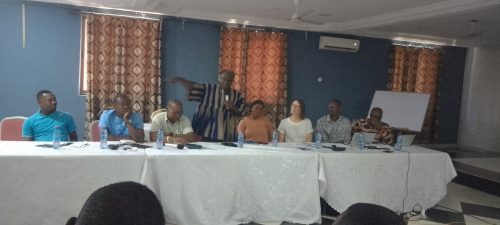
The Techiman Baamu and Hansua Abusuapanin, Nana Agyapong, has call on the District and Municipal Assemblies across the country to strictly enforce planning and building regulations to ensure sustainable urban development.
Nana Agyapong made this assertion during the presentation of key findings from a research project on self-building housing in Ghana, organized by the Center for Democratic Development Ghana (CDD-Ghana) in partnership with the London School of Economics (LSE), the University of Ghana, and the University of Manchester.
The research, which focused on the cities of Accra and Techiman, particularly the communities of Tako Fiano and Hansua, highlighted the dominance of self-building housing in Ghana’s urban landscape, accounting for over 90% of homes nationwide. However, it also underscored several challenges, including poor infrastructure, lack of planning, and weak enforcement of regulations during community expansion.
In an interview with the media, Nana Agyapong emphasized the need for closer collaboration between traditional authorities and local government bodies in managing community growth. He encouraged the Techiman Traditional Council and other traditional councils across the country to work closely with district and municipal assemblies within their jurisdictions to ensure the proper expansion of communities, supported by adequate infrastructure and services.
“Through this workshop, we’ve also realized the importance of collaboration between traditional leaders and the Municipal Assembly. We’ve learned that whenever a chief wants to expand their community, they must collaborate with the Assembly to allocate land for essential infrastructure like schools, markets, car parks, and other facilities that promote development,” he said.
While Ghana’s existing legal framework, particularly the Local Government Act (Act 462), the National Development Planning Commission Act (Act 479), and the National Development Planning (Systems) Act 1994 (Act 480) mandates assemblies to lead in local development, enforcement has been inconsistent. The Local Governance Act, 2016 (Act 936), further empowers assemblies with legislative, deliberative, and executive functions, including responsibility for physical planning and enforcing building regulations.
However, the Hansua Abusuapanin noted that these laws are weakly enforced and stressed the need for stronger implementation to ensure that communities develop in a planned and sustainable manner.
“Although the law already requires this collaboration, it is often not followed. I urge the Municipal Assembly to make it a priority to engage with chiefs and support them in the proper planning of community expansion. Chiefs, in turn, must also work with the Assembly to ensure proper development.” He stated.
CDD-Ghana and its research partners called for a more inclusive housing policy that recognizes self-building as a viable, yet under-supported model. They also urged assemblies to step up their enforcement roles and ensure that development aligns with national planning guidelines.
The workshop and research findings serve as a wake-up call to stakeholders in Ghana’s housing and urban development sectors to prioritize coordinated, planned, and community-inclusive growth.
Source: Elvisanokyenews.net
 ElvisAnokyenews Latest News Portal
ElvisAnokyenews Latest News Portal



